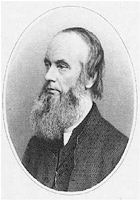The Abbot Of Muchelnaye. Canto The Second. Poem by Henry Alford
The Abbot Of Muchelnaye. Canto The Second.
It is the solemn midnight; and the moon
Hard by the zenith holds her solemn state,
And yon flushed star will westward dip full soon
Behind the elms that gird the abbey--gate;--
There stair and hall are drear and desolate;
And even Devotion doth her votaries spare,
Save the appointed ones on Heaven that wait,
Wafting upon the hushed unlistening air
Tu, Jesu, salva nos--their deep and night--long prayer.
In low flat lines the slumbering dew--mist broods
Along the reaches of the Parret--stream;
And on the far--off vales and clustered woods
Dwells, like the hazy daylight of a dream;
Piled over which, the dusky mountains seem
As a new continent, whose headlands steep
Within his day's fair voyage now doth deem
Some mariner, whose laden vessels creep
Across the dim white level of the severing deep.
In the mid prospect, from its shadowy screen
Rises the abbey--pile; each pinnacle
Distinct with purest light; save where, dark green,
The ivy--clusters round some buttress dwell,
The sharp and slender tracery varying well;
Perfect the group, and to poetic gaze
Like a fair palace, by the potent spell
Of old magician summoned from the haze,
Some errant faery knight to wilder with amaze.
But list! the pendant on the wicket--latch
Hath rung its iron summons; and the sight
Through the uncertain shadowings may catch
A muffled figure, as of some lone wight
Belated in the flats this summer night,
And seeking refuge in the abbey near:
Again those strokes the slumbering band affright,
And cause the wakeful choir, in doubt and fear,
To pause amid their chant, and breathless bend to hear.
Slow moves the porter, heavy with the load
Of age and sleep; some newly happened ill,--
Some way--side murder,--doth his heart forebode;
And at the wicket come, he pauseth still,
And on his brow the icy drops distil;
Till a faint voice admission doth implore;
``Open, blest fathers, the night--damps are chill;
So may your abbot's holy aid restore
One whose life falters now at death's uncertain door.''
The smaller wicket first he inward turns
For caution and assurance; then as slow
By the dim taper--light that flickering burns,
Scans well the stranger, whether friend or foe;
Then stooping draws the massy bolt below,
Well satisfied that such a form as stands
Before him now no treachery can know,
Can bear no weapon in those trembling hands,
Nor be the wily scout of nightly prowling bands.
A holy woman is it, who desires
Speech with the abbot's reverence: ``For fear
Of God in heaven, who each one's life requires
At each one's brother's hand, call thou him here,
Or point me where he rests, that I may clear
My soul of that wherewith I am in trust;
For she who sent me to her end is near:
And who shall make amendment, or be just,
When the pale eye hath mingled with its kindred dust?''
``Sister,--for by thy russet garb I guess
Thou art of yonder saintly company
Whose frequent hymns our holy Mother bless,
Borne hither from St Mary's Priory,
Hard is it for one chilled with age like me
To do thine urgent bidding; close behind
The landing of yon steep stair dwelleth he
Of whom thou speakest; sleep doth seldom bind
His eyelids; wakeful unto prayer thou shalt him find.''
Up the strait stair the long--robed figure glides,
The while the aged man his taper's light
Trims, and with friendly voice the stranger guides,
Till the dark buttress hides her from his sight;
And then he peers abroad into the night,
Crossing himself for fear of aught unblest;
For sprites and fairies, when the moon is bright,
Weave their thin dances on the meadow's breast,
And sharp rays pierce the tombs, and rouse the dead from rest.
He looks not long,--for down the stairs of stone
Footsteps are sounding, and from forth the pile
Passes the stranger, but not now alone.
``Here, brother Francis, let thy keys a while
Rest in my keeping; I will thee assoil
From aught that in mine absence may befall;
So wilt thou spare thyself thy watch and toil
For my return; my blessing guards ye all;
For I must forth, when sorrow for my help doth call.''
The abbot speaks; and they two glide along
In the dim moonlight, till the meadow haze
Enwraps them from the sight: the trees among,
And down the windings of the gleamy ways
They pass; and cross the Parret--stream, ablaze
With flickering ripples; then they track the moor,
Even till they reach St Mary's Priory;
Ere which, the dark--robed stranger goes before,
And without speech admits them through a lowly door.
It is a humble chamber; and a group
Of holy sisters, in their work of love,
Over some prostrate form are seen to stoop,
And in the feeble glimmering slowly move;
And now the abbot sees, bending above,
One stretched in anguish on the pavement there;
In wild unrest her white arms toss and rove;
On the dark floor is spread her tangled hair,
And with convulsive gasps she draws the sounding air.
But see, she beckons, and he draweth near;
Again she beckons; and that sisterhood
Slowly retreat from what they may not hear;
The last is gone;--and now, with life endued,
The abbot's form that lady rose and viewed;
``Sir monk, I am not as I seem this hour!''
He trembles--nay, let no chill doubt intrude--
It is, it is--thine own, thy bride, thy flower,
The high--born Lady Agnes of St Dunstan's tower!
This poem has not been translated into any other language yet.
I would like to translate this poem